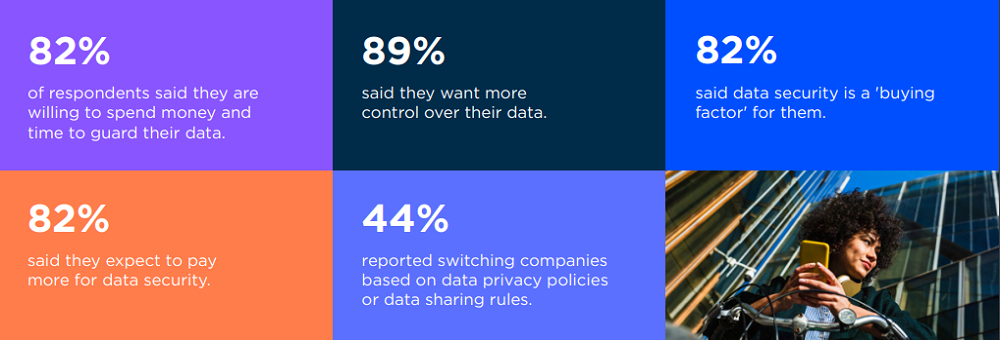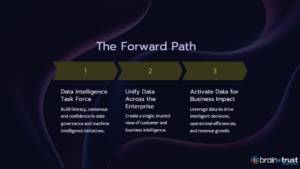Relevance and personalization aren’t brand differentiators anymore — they’re a minimum requirement.
It’s 2023, and customers have come to expect what were once considered to be exceptional marketing experiences from every brand they interact with, every time — but delivering that “exceptional” experience as a matter of routine requires brands to have an intimate knowledge of who their customers are, what they need, and how they want to find it — and that requires lots of data. You can only collect that sort of data from your customers if they opt-in. The good news is they will opt-in to the convenience of sharing their data all the time, enabling them to take advantage of those great, hyper-personalized deals and relevant experiences that keep them coming back to you again and again — but only where they see a genuine value to granting you their consent, and that begs the question: if you can’t deliver value with the information you’re collecting, why are you gathering it?
For consumers, value comes from experiences and interactions that are tailor-made for them by the brands they engage with, brands that remember their preferences and dislikes, offer recommendations that resonate with their tastes, and anticipates their needs. For companies, the opt-in data shared by customers holds the promise of unprecedented insights. By understanding customer preferences, behaviors, and pain points, companies can craft laser-focused marketing strategies that resonate with their audience on a profound level — but at the core of that data exchange lies an indispensable factor: trust.
Today’s consumer wants transparency and a sense that the data they share will be used and safeguarded in a way that aligns with their comfort, protecting them from risks like fraud, identity theft, and more. So, how are some of the world’s biggest brands respecting those desires for privacy across their marketing channels and interactions while still delivering hyper-personalized customer experiences? In many cases, they’re turning to a customer data platform, or CDP.
Building Trust and Data Privacy With a CDP

Consumers look to these brands to be truthful and transparent about their data practices and expect the organizations to treat their personal information responsibly — all essential elements of trust. In this year’s survey, 76 percent of respondents said they would not buy from a company who they do not trust with their data.
A CDP can help effectively unify customer data from both a company’s online and offline data sources, bringing it together into a single “golden customer record,” making it easier to ensure that your company is compliant with any and all relevant regulations — but, more importantly, the privacy wishes of your customers.
The comprehensive surety provided by the best CDPs enables companies to know where all of their prospective and known customer data is at all times — not just within first-party point systems and tools. This makes more nuanced updates to customers’ personally identifiable information (PII) possible and makes confident compliance with requests for erasure and anonymization possible. In other words, a CDP allows you to quickly toggle tracking and prevent unwelcome (and non-compliant) contact with customers who have opted out of brand communications, keeping the customer in control of how their data is used, and helping to establish long-term trust with your brand.
As you can see from the results of Cisco’s most recent Consumer Privacy Survey (image above), more than 80% of consumers said this kind of data security was a buying factor for them. But while data security and data privacy are naturally connected, it’s important to note that they are separate concepts and are not always (or easily) interchangeable. Understanding the differences can help your brand more clearly communicate your privacy policies to consumers and build that valuable trust. To wit:
- Data Privacy: focuses on how data is collected, used, and shared—and involves internal governance of data storage, processing, and sharing. The definition of data privacy varies across geographical and legal contexts (e.g., national vs. international consumer privacy laws), so many companies must take great care to ensure that data is collected and used in compliance with all applicable regulations.
- Data Security: focuses on protecting data from various external/internal threats, including malicious attacks, cyber threats, and inadvertent misuse. A comprehensive data security policy should be implemented and cover three key areas: people with access, processes, and technological solutions that ensure data is secure and protected.
All of which is to reiterate common-sense wisdom that says trust is the foundation of any successful relationship. The customer-business relationship is no exception, and when customers trust a brand, they feel confident in its reliability, integrity, and commitment to their best interests. Trust instills loyalty, repeat business, and real evangelism from customers — but even the most robust data governance and security policies won’t help a company earn and keep that trust if the messaging isn’t clearly understood by the customer.
“At a time when many Americans believe their personal information is less secure and are concerned with how companies and the government use their personal data,” writes Andrew Perrin, of the Pew Research Center, “a substantial share of the public has opted out of using a product or service because of privacy concerns … about half (52%) of US adults said they decided recently not to use a product or service because they were worried about how much personal information would be collected about them.”
It’s 2023. Consumer trust, data privacy, and cyber security aren’t optional add-ons or “nice to haves,” but integral components of an exceptional customer experience that we all crave. By prioritizing these components, companies can build and maintain consumer trust and gain a lasting edge over the competition. Remember: it takes time to build trust, but a single breach of privacy or security can shatter it irreparably — so investing in trust, privacy, and security is beneficial and essential for long-term success in today’s world.
ADDITIONAL NOTES AND SOURCES:
- we discussed the concept of personal control of data and “the right to be forgotten” on the Say-It-Again podcast in an episode titled, “Lizzie Borden, Digital Legacies, and White Hats,” available on Spotify.
- statistics and materials that informed this article were sourced from Treasure Data, in a paper titled, “Privacy, Security, and the Importance of Trust.”
- additional sources include research published by Cisco and Pew Research.







